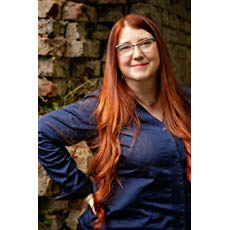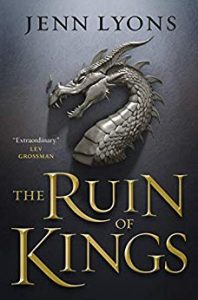Why All Writers Are Worldbuilders
 Sometime last year I remember reading an article about worldbuilding which suggested it was overrated and unnecessary. I had the perhaps predictable kneejerk reaction about it. After all, I take a considerable amount of joy when it comes to the worldbuilding process. I really love worldbuilding. A lot.
Sometime last year I remember reading an article about worldbuilding which suggested it was overrated and unnecessary. I had the perhaps predictable kneejerk reaction about it. After all, I take a considerable amount of joy when it comes to the worldbuilding process. I really love worldbuilding. A lot.
Then I really thought about it. This isn’t a new idea. Every few months I hear someone talk about how worldbuilding is overhyped, a waste of time that would be better spent, well, writing. And again, that’s not unpredictable. Writers have Opinions, after all. Oh god, do we have opinions. We manage to disagree even on the stuff we agree on.
I think if you drill down hard it all boils down to: write the best story you can, by whatever means necessary, and don’t pay too much attention to folks telling you which rules you must follow to get there.
Good enough.
But I’m going to make what may be a bold, even controversial assertion: all writers are worldbuilders. Even if they don’t know it or won’t admit it.
Let me first recount a little anecdote that touches on why I consider worldbuilding to be an important part of my own personal process:
Once, many years ago, I was in a fashion illustration class, and the teacher made a point on the importance of art history. “You must know art history!” she said, “or you will never understand the inspirations behind your designs.”
To which a student raised her hand and smugly announced, “I don’t need to know art history because my designs will be completely original.”
After failing to kill the student with her laser stare, the teacher replied, “No one’s work is original. We regurgitate the influences to which we’re exposed. You either control that process or it controls you.”
I feel that may need to be memorialized in cross-stich. Maybe a tattoo.
It’s a moment that’s stuck with me ever since, because that’s how I feel about worldbuilding. No writer is required to do active worldbuilding. No one will come over to your house and ask to check your notes. You are not being asked to show your work or cite your sources. This is not a college course. But…we regurgitate the influences to which we are exposed.
And if you don’t actively world build, you will passively world build. Your subconscious will do it even if you aren’t aware of the process. What seems right and what fits in your story will be an extension of this process and what ends up on the page will be part of that process, and it will be as inescapable as breathing.
Worldbuilding happens. I would argue it happens every damn time, conscious or unconscious. Every word on the page builds up that vision, communicates that space.
And, I should add, I think that’s fine. There is nothing wrong with a short story that has little to no extensive worldbuilding. Examples are legion. Alyssa Wong’s extraordinary short story A Fist of Permutations in Lightning and Wildflowers neither requires nor needs extensive worldbuilding. Why do the sisters have superpowers? Who cares? That’s not important. Short stories are not required to answer every question they ask and quite frankly such fiddly details would only detract from the story in a medium where every word must be lean and vital.
But I world build precisely because I have written manuscripts where I didn’t. And while those stories weren’t necessarily dull—plots were hatched, evils were schemed, etc.—they did, to echo the words of that teacher so many years ago, blindly regurgitate the influences to which I was exposed. (Think D&D and Tolkien, the Princess Bride and the Mabinogion.
) Lands inexplicably looked and felt like Europe with European names for no reason other than ‘it felt right’— because it was what I was used to seeing around me, and what I had absorbed into my system. (This right here, by the way, is why diversity in fiction is a Good Thing, because otherwise what is absorbed and later revealed tends to look all very much the same after a while.)
For me, breaking free from that unconscious worldbuilding requires a conscious act. It requires sitting down and planning out a whole lot of information and detail that the reader doesn’t need to know but which I do. Only the tiniest pittance of it will make it on to the page, but I’m fine with that.
I’ve invented conlangs, and let me tell you, I really freaking hate creating conlangs (I’m sure someone who enjoys it more can probably tell with just a glance at my work) but I do it anyway because it is vital to avoiding a book where everyone is named something that sounds like it’s probably in the appendix of the Silmarillion. I’ve taken far too much time to break down the climate ecosystems of my fantasy world, figure out the heraldic insignia of noble families the readers may never encounter, and oh dear god, the maps.
To be fair, I really love making maps.
Also, this process isn’t confined to genre fiction. Authors in other genres also world build every time they decide setting, political climate, or who runs the general store down the street. Worldbuilding will exist—one way or another.
So at the end of the day, I can’t tell you whether or not you should world build. I can only tell you that *I* absolutely need to world build. My books are better for my active worldbuilding than they would be without it, and I don’t need to guess that. I’ve done that test. I know.
Which all comes back to the only rule that matters:
Write the best story you can, by whatever means necessary.
—
Jenn Lyons lives in Atlanta, Georgia with her husband, three cats, and a nearly infinite number of opinions on anything from mythology to the correct way to make a martini. Her debut epic fantasy novel, The Ruin of Kings, comes out February 5, 2019, and the second book in the series, The Name of All Things, drops October 29, 2019.
Follow her on Twitter @jennlyonsauthor
 “Everything epic fantasy should be: rich, cruel, gorgeous, brilliant, enthralling and deeply, deeply satisfying. I loved it.”—Lev Grossman, author of The Magicians
“Everything epic fantasy should be: rich, cruel, gorgeous, brilliant, enthralling and deeply, deeply satisfying. I loved it.”—Lev Grossman, author of The Magicians
When destiny calls, there’s no fighting back.
Kihrin grew up in the slums of Quur, a thief and a minstrel’s son raised on tales of long-lost princes and magnificent quests. When he is claimed against his will as the missing son of a treasonous prince, Kihrin finds himself at the mercy of his new family’s ruthless power plays and political ambitions.
Practically a prisoner, Kihrin discovers that being a long-lost prince is nothing like what the storybooks promised. The storybooks have lied about a lot of other things, too: dragons, demons, gods, prophecies, and how the hero always wins.
Then again, maybe he isn’t the hero after all. For Kihrin is not destined to save the world.
He’s destined to destroy it.
Jenn Lyons begins the Chorus of Dragons series with The Ruin of Kings, an epic fantasy novel about a man who discovers his fate is tied to the future of an empire.
Category: How To and Tips
























I’m with you on this one. All writers build worlds ands probably all artists in some ways (I’ll have to think about that). Itg’s one of the early tasks of writing fiction, long or short. They can be familar worlds or fantasy, but build they must.
Itg’s part of the creative process, so I dont understand what the writer your referred to can have meant.
Thanks for this post.
Caroline